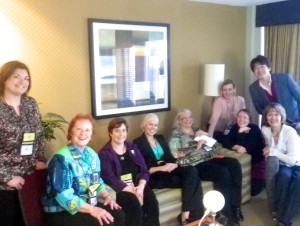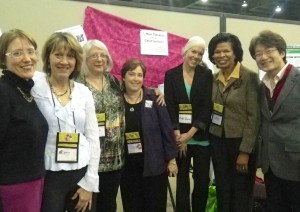Music Therapists Surviving Cancer
Music therapists Ashley Taylor, Cathy Knoll, Lisa Gallagher, Megan Peterson, Carolyn Bowes, Heather Lantry, Faith Halverson-Ramos, and JoAnn Jordan (l-r) gathered around the AMTA-Pro microphone. What do these MT colleagues have in common? All have experienced cancer from different viewpoints. Some are in active treatment, some are celebrating “cancer-versaries”, some are clinicians working with individuals diagnosed with cancer, and some have family members with cancer. In this podcast, they talk briefly about some challenges related to their cancer, and some thoughtful insights and suggestions for music therapists working with people diagnosed with cancer. We invite our MT colleagues to click below for photos, resources, helpful hints, and info about the Facebook group, Music Therapists Surviving Cancer.
[display_podcast]
Music Therapists Surviving Cancer
April, 2013
— + —
MT’s sharing experiences and insights about cancer
Clinical Practice Forum at 2012 AMTA Conference
MT cancer survivors share an inside joke
This short podcast provides a glimpse into the world of cancer from the perspective of music therapists who are surviving cancer as well as those who provide music therapy services to individuals diagnosed with cancer and those who have family members who were diagnosed with cancer. The podcast participants encourage listeners to check for more information on their Facebook group, Music Therapists Surviving Cancer.
Overview of Observations and Suggestions from MT’s Surviving Cancer
Some of the MT’s participating in this podcast developed handouts for the Clinical Practice Forum at the AMTA conference with descriptions of their experiences with cancer as well as some recommendations. For example, Lisa Gallagher provides these tips based on her 5-year battle with cancer and residual pain resulting from radiation treatment:
• Do not say you understand what they are going through unless you really do
• Fatigue is very real and can last for a very long time (even years), so help survivors find some tools to use, as well as help validate that it is okay and that they are not imagining it
• Encourage them to use music during all parts of their treatment and recovery process
• For radiation treatments – preferred music may not be best because a negative association can develop due to the experience
• Stress can occur at every level of the treatment process for the patient, family,
and at times for the medical professionals as well
• Every day is different in terms of energy, pain, fatigue, mood, emotions, etc.
MT graduate student Megan Peterson offers these recommendations based on her hard-fought battle with stage 4 breast cancer:
VIP: Really get to know your client – develop a relationship and friendship.
+ Music therapists want to be aware of the changing sense of normalcy and life goals when a person receives a diagnosis of cancer.
+ Music therapists want to understand the difficulty of separating “cancer” identity from personhood, from “real-self” identity.
+ There is a sense of grief and loss with a cancer diagnosis, along with a strange new sense of community which inevitably intertwines with each other.
VIP: Consider the specific needs of each individual, and develop creative ways to address those issues through music and music therapy. For example:
+ Music therapy can help clients learn how to express thoughts, feelings, and concerns through music.
+ Music therapy can be designed to help clients take care of themselves.
+ Music therapy can help teens who feel out of place when receiving treatment in child cancer centers.
+ Music therapy help individuals and families who spend most of their time sitting and waiting.
VIP: Remember these critical “What Not To Do’s”
#1. Do not just barge in. Introduce yourself before you start talking. Ask if this is a convenient time.
#2. Do not assume kids are going to act a certain way. Each person responds differently to hospitalization, music therapy, and various caregivers. Be open and flexible.
#3. Do not be put off if a patient is using humor as a coping mechanism. Do not assume that if a patient is free of pain, nausea, or worry just because they are making jokes that they are pain, nausea or worry free. Humor can be an effective coping mechanism, so don’t be afraid to share a smile or chuckle with the patient.
#4. Do not run away if a patient is being rude or cranky towards you. Not many people are friendly all the time when they are in pain, discomfort or a nauseous state. It may take a gentle push or multiple attempts from the therapist to encourage the patient to try music therapy.
#5. Do not be afraid to address the hard issues at hand. Tiptoeing around important issues can be more detrimental and hurtful to the patient than being open and honest. Follow the lead of the patient and family.
Music therapist Carolyn Bowes wrote some helpful insights: Because I work in hospice, I was terrified when first diagnosed. In addition to my patients – all experiencing the severe issues related to their varying diseases – my very close friend was battling stage 4 breast cancer and died a few months after my surgery. I think I was not quite as engaged with my families as I usually am during the weeks leading up to the surgery, but it is difficult to say whether this was unwillingness to deal with the whole cancer issue or because I was just generally an emotional mess. I do know that when I returned to work, I was eager to get back into the fight on someone else’s behalf. Music is a fantastic weapon against pain and debility. I was not going to cure anyone’s cancer, but I can make “right now” pretty sweet. That’s saying something. And it is something I hadn’t really appreciated before my surgery. “Making today not horrible” sounds like a trivial goal. But, when you are in the middle of horrible, believe me, it is not a trivial goal. The work we do with music in hospice is so important. Sometimes a patient or family member just wants to talk, and I’m so glad I can offer an informed listening ear. Am I glad the whole cancer thing happened? What, are you nuts?? But, did I come through it a better music therapist? Yep, I think maybe so.
Websites and Other Recommended Sources
Music therapist JoAnn Jordon recommends these resources:
• THYCA: Thyroid Cancer Survivors Association http://www.thyca.org/
• I blog about my thyroid experiences from time to time at
• My main site is: http://www.music2spark.com
Resources from Lisa Gallagher include the following:
• National Cancer Institute at National Institutes of Healthhttp://www.cancer.gov/cancertopics/types/breast
• U.S. Dept of Health & Human Services http://healthfinder.gov/scripts/SearchContext.asp?topic=126
• Susan G. Komen for the Cure – http://ww5.komen.org/
• The Breast Cancer Site – http://answers.thebreastcancersite.com/
Contact Cathy Knoll, MA, MT-BC for further information about the MT Surviving Cancer group <CathyKnoll@gmail.com>


